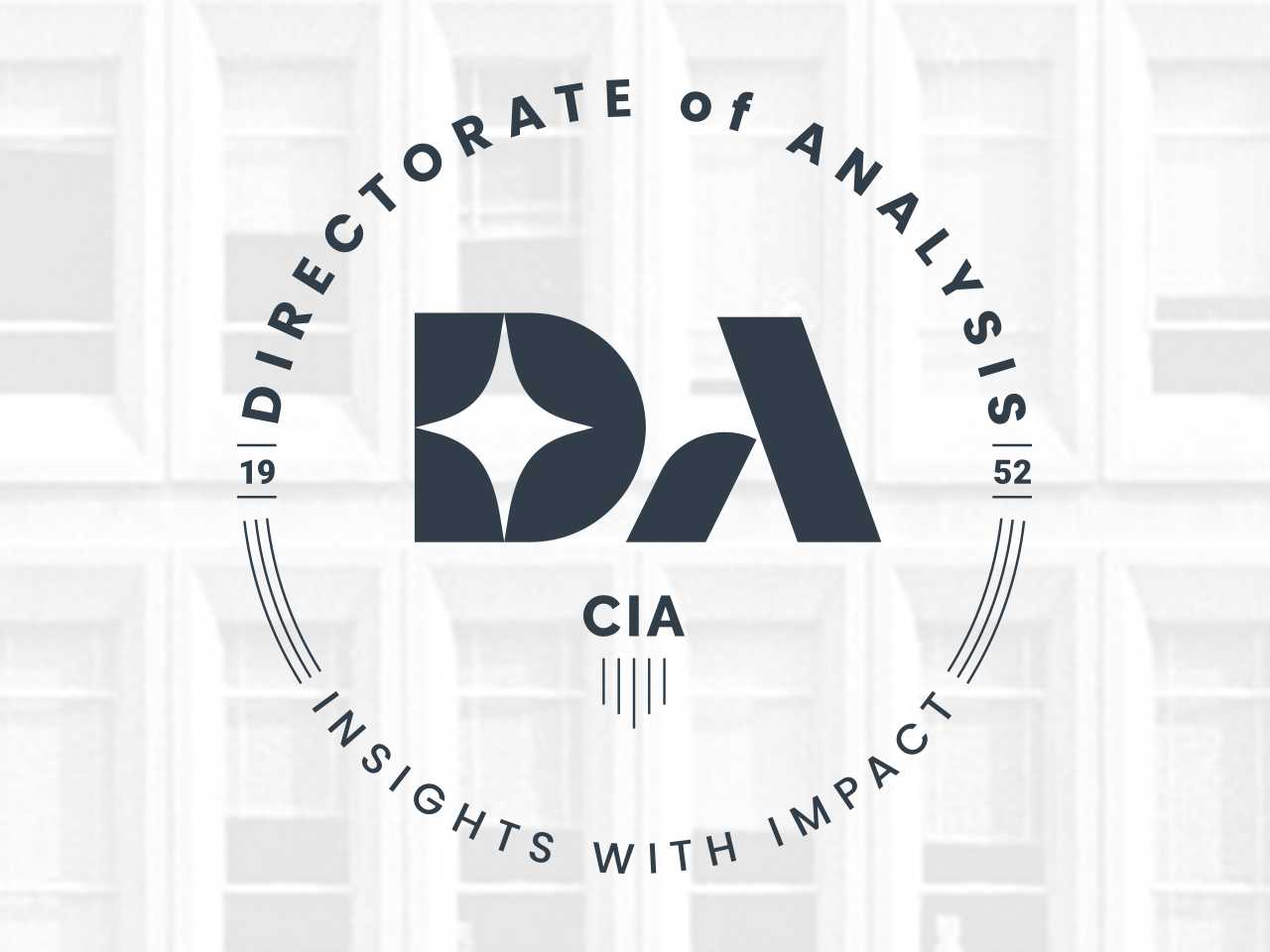
The Directorate of Analysis (DA) provides timely and objective intelligence analysis that informs U.S. officials on key national and foreign policy issues. DA officers use their expertise, creativity, digital acumen, teamwork, and critical thinking to decipher and synthesize incomplete - and sometimes contradictory - information to make sense of a complex world. Our officers deliver unique insights through written reports and visuals and brief policymakers, such as the President and his or her senior advisors, to help them make informed decisions.
We are the Directorate of Analysis
We are the Directorate of Analysis.
We analyze intel, foreign politics, military threats and more.
We look for patterns, draw connections and illuminate the whole story.
We equip our nation’s decision-makers with critical insights that shape policy.
We are the Directorate of Analysis.
The work of a nation. The center of intelligence.
Our Mission and Priorities
Tradecraft & Expertise
DA officers deliver timely, relevant, and insightful analysis that is grounded in deep substantive expertise and tradecraft to support and inform U.S. national security decisions.
Analytic Innovation
The DA leverages emerging technology, develops new analytic approaches, and aligns CIA technical capabilities to make sense of an increasingly complex and digitally connected world.
Organizational Resilience
DA culture is welcoming and recognizes that a range of perspectives, opinions, expertise, and abilities is the DA's greatest strength, and is fundamental to strong tradecraft and insightful analysis.
What We Do
Officers in the Directorate of Analysis (DA) are at the forefront of protecting U.S. national security interests in a fast-changing world. DA officers must anticipate and quickly assess rapidly evolving international developments and their impact on U.S. policy concerns. Technological advances have increased the complexity, scope, and speed of potential threats to our national security, which appear with less warning.
The analytic insights that DA officers provide through written products, visuals, and briefings is a core function of the Agency. Although CIA does not make foreign policy, our analysis of intelligence informs the decisions made by U.S. policymakers. The DA’s interactive designers, graphics designers, and cartographers work closely with analysts to craft products and visuals that convey our judgments. From computer simulations to multi-dimensional maps, visual specialists rely on their creative expertise to serve an active and unique role in supporting the DA’s mission.
The DA’s flagship product is its daily publication, the CIA World Intelligence Review (WIRe). The DA also contributes to the President’s Daily Brief (PDB), which is an Intelligence Community daily product overseen by the Office of the Director of National Intelligence (ODNI). Because information in these two publications is extremely sensitive, they are highly classified and have restricted readership.
- The WIRe is an electronic publication aimed at senior U.S. foreign and security policy officials, members of the U.S. military, and Congress.
- The PDB compiles the Intelligence Community’s most pertinent intelligence analysis covering the key national security issues and concerns of the President. The PDB is given only to the President, the Vice President, and a select group of senior officials designated by the President.
In addition to preparing articles for the WIRe and the PDB, DA officers frequently draft memos to respond to specific questions or support policy meetings on key issues. Analysts also research their areas of specialty to anticipate future challenges and opportunities for U.S. security interests, sharing their insights through a variety of classified publications and briefings.
The DA also publishes unclassified reference aids that are available to the public. The CIA World Factbook is a comprehensive compendium of profiles on more than 260 countries and other entities and includes information on geographic, political, demographic, economic, and military issues. Chiefs of State and Cabinet Ministers of Foreign Governments is a directory of foreign government officials.
History
The Directorate of Analysis (formerly the Directorate of Intelligence or DI) was established in 1952, though its roots trace back to the Research & Analysis Branch of the World War II-era Office of Strategic Services (OSS). The heart of CIA's analytic mission has remained constant - to deliver objective assessments about the world to some of the most important people in U.S. Government. We examine foreign individuals, groups, events, and trends that affect our national interests and those of our allies. This information derives from a variety of sources and methods, including U.S. personnel overseas as well as agent reports, satellite photography, foreign media, and sophisticated sensors.
Throughout the years, the DA has covered crises and confrontations, identified trends, and illuminated issues. It has produced timely information and insights available nowhere else and put them into the right hands at the right time. In so doing, it has often altered the course of history for the better.
Frequently Asked Questions
Yes, there are a limited number of openings for outstanding undergraduate and graduate students to work in the DA as interns or grad fellows. We are particularly interested in students who are collaborative, innovative, creative, resourceful, and intellectually curious. These highly competitive positions offer the full range of employee benefits, including health insurance, paid holidays, and possible tuition assistance in some cases. We ask students to apply about nine months before they are available to begin work.
Learn more about CIA's Student Programs
A DA analyst will spend the majority of his/her career at CIA Headquarters. At various points throughout their careers, however, DA analysts may travel overseas on short trips ranging from a few days to several weeks to learn more about the region or topic they have been assigned to follow. In some cases, depending on their responsibilities or language skills, analysts may spend several months working abroad, to support, for example, US military operations, or they may choose other overseas opportunities to deepen their expertise.
It depends on pressing national security needs, your own interests, and the skills and knowledge you bring to the job. Some analysts choose to concentrate on deepening their substantive expertise and technical command of their topic area, while others may opt to expand their expertise by working a variety of topics. Regardless of their area of specialty, however, all analysts can broaden their skills as intelligence officers by working on an interagency task force, doing a tour in a policy or law enforcement agency in downtown Washington, or serving in a rotational assignment elsewhere in the Agency or the Intelligence Community.
DA officers are incredibly diverse. What they all share is a passion for making a difference and contributing to national security decisions made by senior policymakers. If you have an intense desire to learn, if you enjoy digging deep into an issue or region of the world, and if you are stimulated by the intellectual challenge of making sense of incomplete and often contradictory information, then working in the DA may be the job for you.
In general, it is advisable to be discreet, both for personal and professional reasons. Because of the classified nature of the Agency’s work, you should not talk to others about the details of your work. Security precautions and restrictions are a fact of life with all CIA jobs.
Careers
A career in the Directorate of Analysis means anticipating and quickly assessing evolving international developments. The DA's mission to provide timely, insightful, and objective analysis on a diverse set of countries, issues, people, and cultures means we look for individuals with a variety of academic backgrounds and experience. There is no “one-size-fits-all” career path in the DA. Once an officer successfully completes their first assignment, they have a variety of options for follow-on positions and can take advantage of a range of development opportunities. DA officers go through specialized training to receive a grounding in analytic tradecraft and methods and many develop extensive expertise in a region or topic.
DA officers can consider a number of options to deepen their expertise as intelligence professionals—an overseas tour, an assignment on a different substantive area, or full-time language or academic training. In addition, DA officers may consider assignments that broaden their knowledge of the intelligence business, such as a tour in a different part of CIA or in another agency within the Intelligence Community. They might also spend time working in our 24/7 Operations Center.
More senior officers may take on corporate assignments working with different components at the highest levels of CIA. Some may work at a policy agency, such as State Department, Department of Defense, or the National Security Council, or teach other analysts. Many are recognized across the U.S. Government as experts in their field.
The DA’s Multimedia and Production Officers are a vital part of making sure DA analytic insights are delivered efficiently and effectively to US policymakers. Working closely with analysts, our editors, publication officers, interactive designers, graphics designers, and cartographers help craft products and visuals that effectively convey our analytic judgments. From computer simulations and virtual reality to multi-dimensional maps, visual specialists are key to supporting the DA’s mission.
All DA officers have the option of building expertise on a particular country, region, or issue, or they can choose a path that leads to management responsibilities. Both choices offer challenging opportunities and similar rewards in terms of advancement. Most assignments will help build skills for either track, and officers can explore their interest and aptitude for becoming senior experts or managers through training and assignment opportunities after their first few years in the organization.
A limited number of undergraduate internships, graduate fellowships, and student programs are available. All our employees must be U.S. citizens. If you are looking for the chance to serve your country, if you like intellectual challenges, if you thrive in a fast-paced environment, and if you want to make a difference, then you may be a great fit for a career in the DA.
